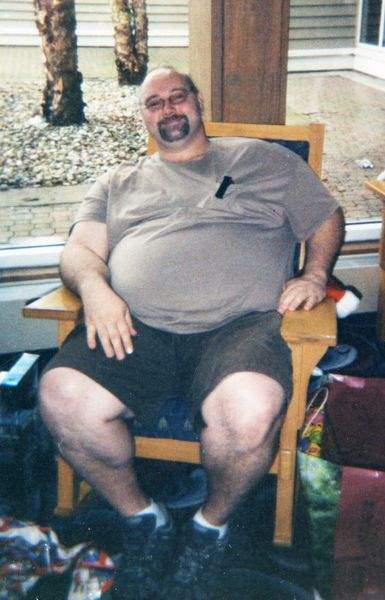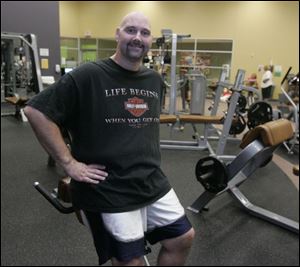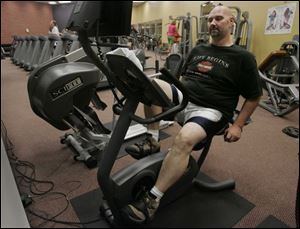
Medically directed weight-loss programs gaining in demand
10/22/2007
Toledoan Scott Berry in a before photo lost 106 pounds through gastric bypass surgery and a change in lifestyle.
Handout not Blade photo

Berry
Scott Berry s recipe for morbid obesity has three ingredients: The convenience of fast food, eating out of boredom, and a family history of weight problems.
The 35-year-old Toledoan s formula yielded adult-onset diabetes, high blood pressure, and high cholesterol.
My diabetes was out of control, said Mr. Berry, who took several medications and tried various diets.
Mr. Berry was referred by his primary doctor to the Center for Weight Loss Surgery at Wood County Hospital in Bowling Green. After assessment and counseling, Mr. Berry weighed the risks and had surgery in July, and so far his weight has dropped from 373 to 267 pounds and he no longer needs medication.
With obesity, diabetes, and other health problems continuing to climb among adults in Lucas County and beyond, various medically directed methods aimed at helping people shed pounds are gaining in demand.
In Lucas County, for example, 70 percent of adults are overweight or obese, according to the 2007 Lucas County Adult Health Assessment. And 54 percent of Lucas County adults were trying to lose weight, according to the study commissioned by Healthy Lucas County.
Many hospitals in the area offer bariatric surgery, including Toledo Hospital and St. Luke s Hospital, although Wood County has the most options at four. Other options include medically supervised diets, supplements, hospital support groups, and even a residential weight loss program housed in a Gibsonburg nursing home where one patient lost 1,000 pounds in two years.

Toledoan Scott Berry in a before photo lost 106 pounds through gastric bypass surgery and a change in lifestyle.
All programs stress the need to eat wholesome food and exercise.
Toledoan Hugh Grefe this year has lost 155 pounds through the four-year-old Mercy Weight Management Center in Toledo, and his sleep apnea is gone. Unlike other programs Mr. Grefe has tried, the nutritionally complete diet he was prescribed which initially called for at least three shakes and two packaged entrees a day from Health Management Resources Corp. taught him to keep track of what he eats.
Mr. Grefe said he didn t realize how much he ate because of stress or out of habit, such as the 400 to 500 calories he consumed right after coming home from work. Exercise and healthy foods such as fruits and vegetables are stressed at weekly program meetings, not weight loss, he said.
There s been no surgery or magic involved, Mr. Grefe said. You have to get serious about it.
Said Amy Watkins, supervisor of the Mercy Health Partners program: It s not about willpower as most diets are. It s about skills.
Dr. Samuel Christian, a former bariatric surgeon in Tiffin, developed a program called Mannafast Gastric Conditioning used at Windsor Lane Health Care Center in Gibsonburg. Currently about 70 of his patients from across the country are at the nursing home, which has dedicated space for the program to treat the morbidly obese, he said.
They ve been saying its been an epidemic for years, and each year it s getting worse, said Dr. Christian, who recently wrote a book called Mannafast Miracle for overweight people who want to lose a few pounds.
I believe we re at a critical point where we absolutely have to turn it around.
Appreciating wholesome food and eating less to shrink the stomach are key to Mannafast, Dr. Christian said. The patient who lost 1,000 of his 1,500 pounds, Mark Minch, who moved from Ohio to Iowa, did so without using the meal-replacement shakes and other items the program sells.

Toledoan Scott Berry works out and no longer needs medication to treat his diabetes.
Some programs are more grass-roots.
Maumee chiropractor Tom Baur is director of a weight-loss initiative incorporating Garden of Life nutritional supplements that began as a pilot program this spring at the Church on Strayer, formerly called Cathedral of Praise, in Monclova Township. During that pilot program, 126 Healthy Toledo participants lost more than 1,700 pounds in less than 11 weeks.
The program is branching out to other communities throughout northwest Ohio and southeast Michigan, Mr. Baur said.
It is using churches, coffee houses, and other places for people to meet and discuss nutrition, exercise, and other health aspects, he said.
St. Luke s offers both weight-loss classes, called Lifesteps Weight Management Program, and one type of bariatric surgery.
The 12-week classes focus on keeping a food diary, at-home exercises, proper portion sizes, eating whole grains, and other concepts of good nutrition, said dietitian Jennifer Schnipke, an instructor.
Dr. Timothy Duckett, meanwhile, performs Lap-Band operations, where an adjustable silicone band is placed around part of the stomach to create a pouch. When patients eat, they feel full when the pouch is full and eat less.
Many of Dr. Duckett s patients are diabetic, and many are able to get off insulin after losing weight, he said.
This isn t to get you looking good in a bikini, Dr. Duckett said. This is to save years on your life.
At Toledo Hospital, the type of surgery that Dr. Patrick White performs, gastric bypass, resolves diabetes 84 percent of the time. Research is being done to see whether diabetes can be treated with the surgery, where a small pouch is created at the top of a patient s stomach and the intestine is attached to it, he said.
More patients likely would get bariatric surgery if their insurance plans didn t exclude them, Dr. White said. Other patients often have to wait for coverage, he said.
Mr. Berry, the Wood County patient who has lost 106 pounds, had gastric bypass surgery. His surgeon, Dr. Brian Lane, also performs Lap-Band and two other types of bariatric surgery.
As part of the process, Mr. Berry had to go through nutritional counseling and a psychological exam before surgery to ensure he was a good candidate.
Mr. Berry said he learned a lot about nutrition, and he works out three times a week.
Wood County patients are told during instructional sessions about the possible risks or side effects associated with gastric bypass surgery, such as the tendency to vomit or have diarrhea after eating, said Nancy Wensink of Custar, Ohio, who had the surgery last year and has lost 127 pounds.
They just have to hang in there, and it will get better, said Mrs. Wensink, who had a mild case of side effects.
Mrs. Wensink said her diabetes is under control, and other health problems have been resolved or improved since the surgery.
She can ride a bike for the first time in 10 years, and she routinely takes walks that would have quickly made her breathless, she said.
It s really made a world of difference, Mrs. Wensink said.
Contact Julie M. McKinnon at: jmckinnon@theblade.com or 419-724-6087.